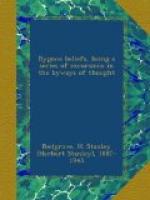WHICHCOTE became M.A., and was elected a fellow of his college, in 1633, having obtained his B.A. four years previously. He was ordained by JOHN WILLIAMS in 1636, and received the important appointment of Sunday afternoon lecturer at Trinity Church. His lectures, which he gave with the object of turning men’s minds from polemics to the great moral and spiritual realities at the basis of the Christian religion, from mere formal discussions to a true searching into the reason of things, were well attended and highly appreciated; and he held the appointment for twenty years. In 1634 he became college tutor at Emmanuel. He possessed all the characteristics that go to make up an efficient and well-beloved tutor, and his personal influence was such as to inspire all his pupils, amongst whom were both JOHN SMITH and NATHANAEL CULVERWEL, who considerably amplified his philosophical and religious doctrines. In 1640 he became B.D., and nine years after was created D.D. The college living of North Cadbury, in Somerset, was presented to him in 1643, and shortly afterwards he married. In the next year, however, he was recalled to Cambridge, and installed as Provost of King’s College in place of the ejected Dr SAMUEL COLLINS. But it was greatly against his wish that he received the appointment, and he only consented to do so on the condition that part of his stipend should be paid to COLLINS—an act which gives us a good insight into the character of the man. In 1650 he resigned North Cadbury, and the living was presented to CUDWORTH (see below), and towards the end of this year he was elected Vice-Chancellor of the University in succession to TUCKNEY. It was during his Vice-Chancellorship that he preached the sermon that gave rise to the controversy with the latter. About this time also he was presented with the living of Milton, in Cambridgeshire. At the Restoration he was ejected from the Provostship, but, having complied with the Act of Uniformity, he was, in 1662, appointed to the cure of St Anne’s, Blackfriars. This church being destroyed in the Great Fire, WHICHCOTE retired to Milton, where he showed great kindness to the poor. But some years later he returned to London, having received the vicarage of St Lawrence, Jewry. His friends at Cambridge, however, still saw him on occasional visits, and it was on one such visit to CUDWORTH, in 1683, that he caught the cold which caused his death.
JOHN SMITH was born at Achurch, near Oundle, in 1618. He entered Emmanuel College in 1636, became B.A. in 1640, and proceeded to M.A. in 1644, in which year he was appointed a fellow of Queen’s College. Here he lectured on arithmetic with considerable success. He was noted for his great learning, especially in theology and Oriental languages, as well as for his justness, uprightness, and humility. He died of consumption in 1652.
NATHANAEL CULVERWEL was probably born about the same year as SMITH. He entered Emmanuel College in 1633, gained his B.A. in 1636, and became M.A. in 1640. Soon afterwards he was elected a fellow of his college. He died about 1651. Beyond these scant details, nothing is known of his life. He was a man of very great erudition, as his posthumous treatise on The Light of Nature makes evident.




